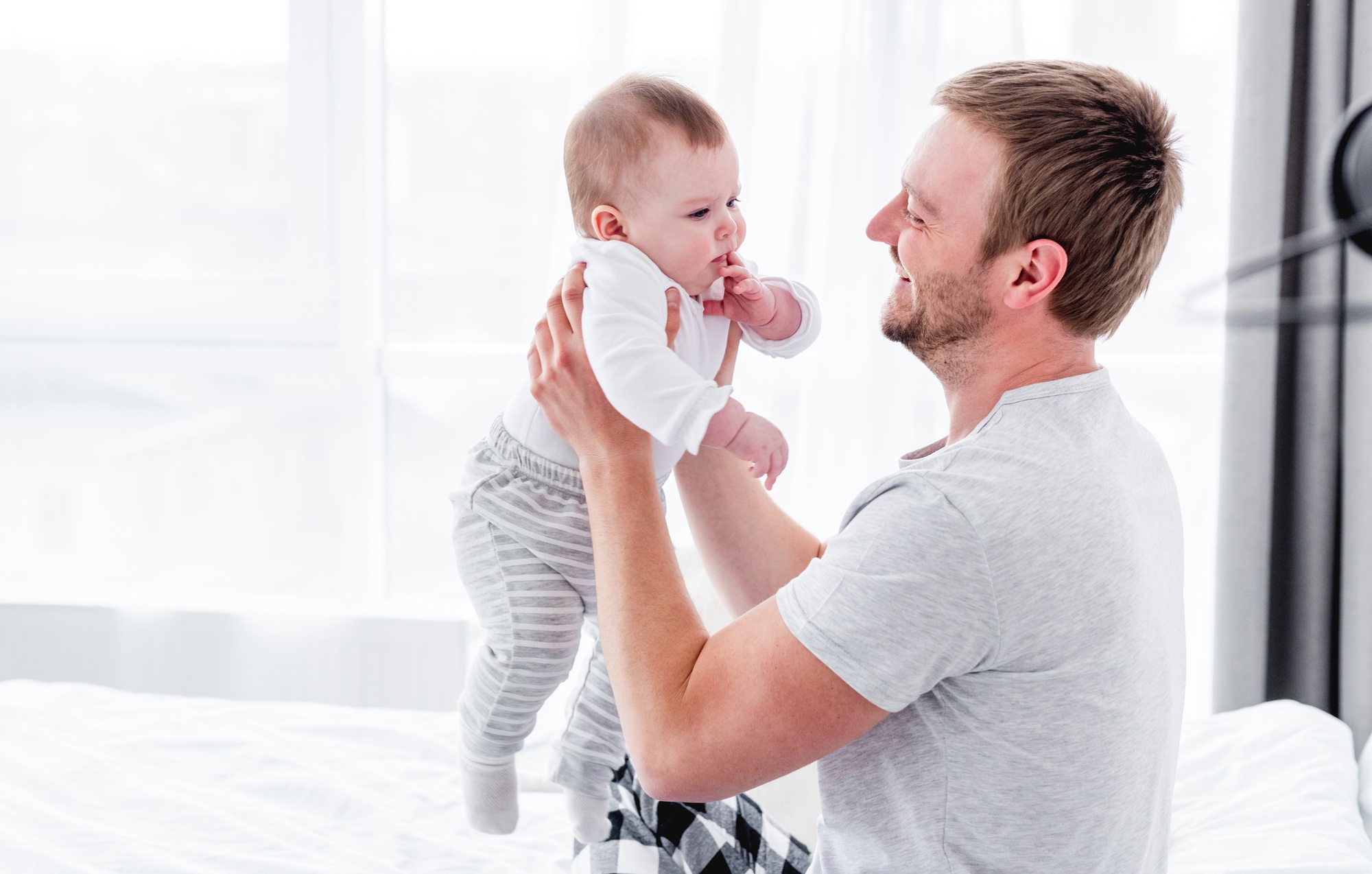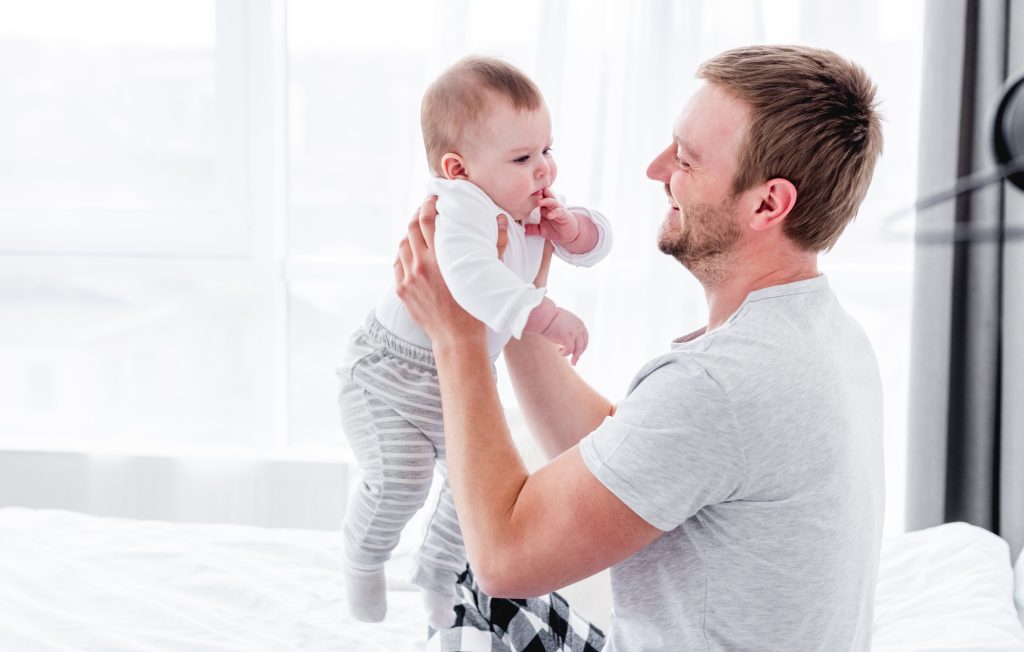Becoming a dad for the first time is an exciting yet challenging journey full of new experiences for expectant fathers.
From preparing for your baby’s arrival to supporting your partner during pregnancy, including understanding trimester changes and prenatal care, there’s a lot to learn.
This guide provides essential insights on what to expect during pregnancy, dealing with pregnancy symptoms, how to help out, and tips for bonding with your newborn.
Find practical advice for new fathers, including parenting styles and emotional support strategies, to help you get ready for the journey ahead.
Embrace fatherhood with confidence by preparing for potential relationship changes!
Table of Contents
Preparing for Fatherhood
.jpg_00.jpeg)
Preparing for fatherhood can be both exciting and overwhelming, particularly for first-time dads entering this new stage of life, especially during early pregnancy.
It’s important to learn from a thorough pregnancy guide to understand prenatal care, baby milestones, pregnancy nutrition, and the emotional changes you and your partner may go through.
You’ll encounter questions about labor and delivery, including natural birth or cesarean section, parenting styles, and how to offer emotional support during this significant time.
How Can Dads Prepare for Fatherhood?
As a new dad, there are several ways to prepare for fatherhood, making the transition easier when your baby arrives. This involves learning parenting advice, setting up a baby registry, and understanding how family dynamics will change, including family planning.
Consider attending birthing classes with your partner to gain insights into the delivery process, including potential pregnancy complications. Hospital tours can help reduce anxiety by getting you familiar with the environment and available resources, such as your healthcare provider and labor coach.
Having an open discussion about your birth plan, including options like epidural or natural birth, can align your expectations and strengthen your connection.
Engaging in these activities builds confidence and encourages open communication, which is essential for handling parenting challenges. As a couple, focusing on discussing each other’s feelings and concerns will create a solid foundation for a healthy relationship during this transformative time.
What Should Dads Expect During Pregnancy?
Expecting a baby brings both excitement and uncertainty, and as a dad, you might wonder what will happen during pregnancy. It’s important to understand pregnancy symptoms and how to provide emotional support. Being prepared with knowledge about prenatal vitamins, pregnancy nutrition, and healthy habits can help you support your partner.
Pregnancy can cause hormonal changes that affect both physical and emotional well-being, so it’s essential for fathers to be attentive and responsive. Knowing the signs of labor, such as contractions, can help dads act effectively during important moments and reduce any anxieties.
Relationships may change during this time, and attending antenatal classes together can help fathers gain insights and strengthen their bond with their partner. Engaging in prenatal education nurtures understanding and prepares both parents for the challenges and joys ahead.
Supporting Your Partner During Pregnancy
Supporting your partner during pregnancy, including attending prenatal yoga classes together, is important for her wellbeing and your relationship as you get ready for your baby’s arrival.
For first-time dads, recognizing the importance of emotional support and participating in prenatal care can help manage the challenges she might face, such as typical pregnancy symptoms, emotional changes, and potential pregnancy complications.
How Can Dads Support Their Partner During Pregnancy?
Dads play a crucial role in supporting their partners during pregnancy, and good communication, as well as understanding pregnancy myths, is essential. By being attentive and offering emotional support, first-time dads can help reduce stress and make their partners feel appreciated and understood during this significant time.
Along with being emotionally supportive, fathers can take practical steps to help out. Taking on tasks like cooking or grocery shopping can greatly reduce their partner’s workload.
Attending prenatal appointments and consulting with your obstetrician shows involvement and fosters a sense of partnership as both can share the experience and address any health concerns together. It’s important for dads to talk about their feelings openly, which strengthens their emotional connection.
Helping set up the nursery and shop for baby gear, including diaper bag essentials, not only improves readiness but also builds the father-baby bond, making the upcoming journey more inclusive and supportive.
What are the Physical and Emotional Changes During Pregnancy?
Pregnancy involves significant physical and emotional changes that can be both inspiring and challenging. For first-time dads, understanding these changes and various symptoms, such as pregnancy complications, is important for providing effective support and empathy throughout the prenatal care journey.
Physical changes often include symptoms like weight gain, fatigue, and morning sickness, which may leave an expectant partner feeling overwhelmed. Emotional changes, such as mood swings and anxiety, are also common and can present additional challenges.
It’s important for dads to recognize these shifts and engage actively as supportive partners. By keeping communication open and offering emotional support, they can help reduce the stress of these changes.
Simple actions, like attending doctor’s appointments together or listening attentively, can greatly help ensure their partner feels understood and cared for during this transformative time, easing the journey into parenthood.
How Can Dads Help with Pregnancy Symptoms?
.jpg_01.jpeg)
Supporting your partner with pregnancy symptoms is an important aspect of being an involved dad. Providing comfort during nausea or helping manage emotional changes, such as those caused by hormonal shifts, can strengthen your relationship and make the prenatal experience smoother.
Dads can take various steps to support their partners during this time, utilizing effective coping strategies.
- Offering physical comfort, like gentle back rubs or a warm blanket, can create a soothing atmosphere, especially during times of stress or discomfort.
- Encouraging healthy eating by preparing nutritious meals together can reduce discomfort and boost energy, contributing to overall maternal health.
- Participating in light activities, such as walking or prenatal yoga, promotes physical health, reduces stress, and helps manage sleep deprivation.
It’s also important to have open conversations, recognizing signs of distress and learning coping strategies together to build emotional strength and create a supportive environment for a positive journey into parenthood.
Preparing for the Baby’s Arrival
Preparing for a baby’s arrival involves several practical steps that first-time dads should take to create a supportive environment for the newborn and the family, ensuring proper family support.
Tasks like setting up a nursery, creating a baby registry, and organizing family support, such as a baby shower, can help make the transition into parenthood smoother.
What Should Dads Do to Prepare for the Baby’s Arrival?
As the due date nears, there are important steps dads should take to get ready for their baby’s arrival, making the transition smooth for the whole family. These include understanding the importance of maternity leave and postpartum recovery. These include:
- Getting essential baby items
- Taking a hospital tour
- Discussing family roles, including the dad’s role, to prepare everyone for the newborn
Involving partners in discussions about the birth plan, including potential options like epidural, cesarean section, or home birth, is key to building unity and understanding. It’s also important to review different labor pain management options so both parents are comfortable with the choices.
Having necessary baby supplies, like diapers, clothing, and feeding items, ready beforehand can reduce last-minute stress.
Additionally, considering financial planning is crucial, as new parents must budget for medical costs, baby essentials, and possible childcare expenses, easing the transition into parenthood without extra financial worry, ensuring a smoother postpartum recovery.
What are the Must-Have Items for New Dads?
Having the right baby gear is essential for new dads to be ready for newborn care. From diaper changing essentials to safe sleeping spaces, and understanding newborn sleep schedule, knowing what items you need can make caregiving easier.
You will need a good supply of diapers and wipes to keep your baby clean and comfortable. A variety of clothing, such as onesies, socks, and hats, is important since babies often need several changes a day.
- Feeding supplies, like bottles, formula, and bibs, should also be included.
To make things easier for new parents, setting up a baby registry allows family and friends to help by providing these essential items, making sure the new dad is prepared for what lies ahead, including understanding pediatric health needs.
Being a Hands-On Dad
Being an involved dad is essential for building a strong connection with your baby and being actively engaged in their life, fostering nurturing and father-baby interactions.
Embracing tasks like diaper changes, late-night soothing, and managing sleep deprivation not only helps your partner but also creates lasting bonds during the early months.
What are the Responsibilities of a New Dad?
The role of a new dad involves more than financial support; it includes many tasks essential for newborn care. From changing diapers to attending pediatric appointments and understanding safe sleep practices, first-time dads play a vital role in creating a loving environment for their baby.
This involvement also includes feeding, whether taking turns with nighttime bottles or calming the baby during fussy periods. Helping with bedtime routines, such as reading stories, bonding time, or gently rocking the baby to sleep, strengthens the bond and provides security for the infant.
Working together with a partner is important for balanced parenting. By discussing and adapting to their unique styles, and considering work-life balance, both parents can create a harmonious family dynamic, supporting each other through the challenges and joys of parenthood.
How Can Dads Bond with Their Baby?
.jpg_10.jpeg)
Bonding with your baby is a rewarding part of being a dad and helps build a strong, lasting relationship. Activities like holding, talking, and playing with your baby can greatly improve your connection and provide important emotional support, fostering child development.
Using techniques like baby massage, reading together, and making direct eye contact can strengthen this bond even more. For example, gentle massage comforts the baby, promotes relaxation, improves sleep, and fosters security. Reading together boosts cognitive development and creates treasured moments that enhance your emotional connection. Eye contact allows fathers to convey love and assurance, building the baby’s trust.
These activities not only support the baby’s growth and emotional health but also improve a father’s own emotional well-being, increasing confidence and joy in parenting. Engaging in these bonding experiences is vital for first-time dads and expectant fathers as they navigate the path of parenthood.
Caring for Your Newborn
Taking care of your newborn can be challenging but very rewarding, requiring patience, love, and attention to detail.
As a new dad, learning the basics of newborn care, like diapering, feeding, and monitoring key baby milestones and comforting techniques, will help you give your infant the best start. Participating in parenting classes and consulting with a healthcare provider can also enhance your skills and confidence.
What are the Basics of Newborn Care?
For new dads, learning the basics of newborn care is important for creating a safe and nurturing environment for their baby. Key areas include diapering, safe sleep practices, and setting up feeding routines for your baby’s health and comfort.
Safe sleep guidelines recommend placing your baby on their back in a crib without soft bedding to lower the risk of SIDS. Whether you choose breastfeeding or formula feeding, each option has its benefits. Consulting with a pediatrician can assist you in making informed decisions about your baby’s nutrition. Breastfeeding offers many health advantages, while formula provides a convenient alternative.
Paying attention to your baby’s cues, like signs of hunger or the need for comfort, can improve feeding routines. New dads may face challenges like sleepless nights and understanding the baby’s needs.
Developing a regular schedule, getting help from caregivers, and taking care of yourself can make this transition easier and boost your confidence.
How Can Dads Help with Breastfeeding?
Dads play an important role in supporting their partner with breastfeeding, helping create a positive experience for both mother and baby. By offering emotional support and practical help, fathers can boost their partner’s confidence and comfort during this time.
One way dads can help is by assisting with breastfeeding positioning, ensuring both mother and baby are comfortable. Providing healthy snacks and drinks can also support the mother’s stamina and well-being during feedings.
Encouraging regular breaks allows her to rest and recharge while feeling supported.
Looking into parenting resources or joining support groups can provide valuable insights and connections with others on the same journey, helping both parents feel enableed and informed in their roles.
Taking Care of Yourself as a New Dad
As a new dad, looking after yourself is as important as caring for your newborn because your well-being affects your ability to provide support and love.
Focusing on self-care, managing stress, and maintaining mental health during this time will help you handle parenting challenges more effectively.
How Can Dads Practice Self-Care?
Practicing self-care as a new dad is essential for maintaining mental health and being present for your baby and partner. Simple strategies include setting aside time for hobbies, exercising, and seeking parenting resources to help with the challenges of fatherhood.
Meditation can reduce stress and provide clarity in the busy life of a parent. Managing your time effectively—not just balancing work and family, but also creating personal downtime—can lead to a more peaceful home environment.
A balanced schedule that includes family time and moments for self-reflection is crucial. It’s also important for new fathers to communicate openly with their partners about their feelings, needs, and expectations. This dialogue not only strengthens the relationship but also ensures that both parents feel supported.
What are the Signs of Postpartum Depression in Dads?
.jpg_11.jpeg)
Recognizing signs of postpartum depression in fathers is important for addressing mental health issues that may emerge after a child’s birth. Symptoms like sadness, anxiety, irritability, and withdrawal stress the need for emotional support and open communication in the family.
These emotional challenges affect the father’s well-being and significantly impact family dynamics and parenting. When fathers experience these symptoms, bonding with their newborn may be difficult, leading to isolation and frustration for their partner. This can create tension, causing parents to drift apart instead of supporting each other.
Encouraging fathers to seek help through support groups and community resources is crucial in breaking this cycle. By promoting openness about mental health, families can create a nurturing environment that benefits everyone and supports healthier parenting.
Frequently Asked Questions
What should first-time dads expect during their partner’s pregnancy?
First-time dads can expect their partner to experience a variety of physical and emotional changes during pregnancy, especially during different trimesters. They may also notice changes in their own relationship and daily routines. Learning about pregnancy symptoms and seeking guidance from a healthcare provider is beneficial.
How can first-time dads support their partner during pregnancy?
First-time dads can support their partner by being understanding, actively listening, attending appointments, and helping out with household tasks. They can also educate themselves about pregnancy and childbirth through prenatal education classes to better understand their partner’s experience.
What are some common pregnancy symptoms for expecting mothers?
Some common pregnancy symptoms include nausea and vomiting, fatigue, mood swings, frequent urination, and food cravings. Every woman’s experience is different, so it’s important to communicate with your partner and learn about her specific symptoms.
How can first-time dads prepare for labor and delivery?
First-time dads can prepare for labor and delivery by attending childbirth classes, discussing a birth plan with their partner, and familiarizing themselves with the signs of labor and contractions. They can also consider options such as epidurals or cesarean sections. Additionally, packing a hospital bag and planning for the baby’s arrival are important steps.
What are some ways first-time dads can bond with their unborn baby?
First-time dads can bond with their unborn baby by talking, singing, or reading to the baby, feeling their partner’s belly for kicks, and attending ultrasound appointments where they can hear the baby’s heartbeat. They can also be involved in choosing a name and setting up the baby’s nursery with essential baby gear.
How can first-time dads take care of themselves during their partner’s pregnancy?
First-time dads can take care of themselves during their partner’s pregnancy by staying physically active, eating a healthy diet, and incorporating exercise during pregnancy. Getting enough rest and seeking support from others, including family support, is crucial. Prioritizing self-care and stress management during this time is essential for their own well-being.







